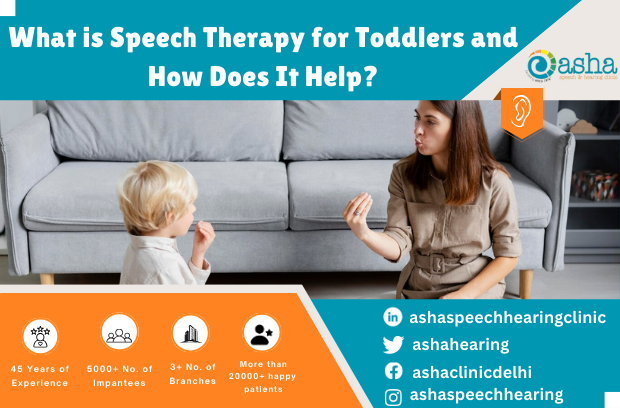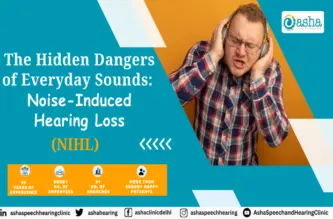- June 11, 2025
- Asha Agarwal
- Comment: 0
- blog
Each child is unique and grows at different speeds. But, if your toddler struggles with forming, understanding, and pronouncing words correctly, then they might be experiencing some sort of speech delay. According to the World Health Organization (WHO), approximately 10% to 15% of children worldwide suffer from speech and language disorders due to various causes. Some children are late talkers because they take longer to mature. Others may have an expressive language delay as a result of hearing loss or a developmental issue like an Autism Spectrum issue (ASD). Illness, hearing problems, or brain disorders can also develop language or speech impairments in toddlers.
However, through evidence-based interventions, speech therapy services can assist your toddler in meeting developmental milestones and communicating their needs. To understand what speech therapy for toddlers is and how it helps, continue reading this blog.
What is Speech Therapy for Toddlers?
Speech therapy for toddlers is a kind of intervention used to support young children in developing efficient communication skills. It involves collaborating with a trained Speech and Language Pathologist (SLP) or speech therapist to enhance toddlers’ language, communication, and speech skills.
There are various types of speech therapy, and their use is determined by the child’s age and the situation. For example, therapeutic approaches differ for children with stuttering, difficulty swallowing, and late talkers. However, the ultimate goal of Speech Therapy for Toddlers is to improve the development of fundamental communication skills, confidence, and general ability to engage with the environment. Specifically, toddler speech therapy focuses on enhancing articulation, vocabulary, voice quality, fluency, play, and social skills.
What Does Toddler Speech Therapy Help With?
There are several reasons why a child may require speech therapy. Common ones include:
Speech Sound Disorder: This indicates trouble in producing speech sounds and combining them to form words.
Language Disorder: This means difficulty in understanding and using language to communicate. Language impairments can influence vocabulary development, grammar, storytelling, following directions, answering questions, and other skills.
Social Communication Disorder: This known as pragmatic language disorder indicates the struggle of a toddler to socialize through language. It includes trouble recognizing social signs, taking turns in conversations, starting or maintaining conversations, and knowing personal space as well.
Voice Disorder: The voice quality of children will vary. For instance, it can be too hoarse or nasal.
Feeding/Swallowing Disorder: This manifests as trouble sucking, chewing, and/or swallowing food or liquids.
Cognitive-Communication Disorder: This involves difficulties with memory, logic, problem-solving, and organization. As a result, communication abilities will be affected.
Stuttering/Fluency Disorder: This indicates difficulties in maintaining a smooth flow of speech. Phonological repetitions, word prolongations, and/or speech pauses are all possible signs of a fluency issue.
When Does a Toddler Need Speech Therapy?
Children may require speech therapy when they have not reached speech/language milestones by the appropriate age. Each child’s milestones are unique. So, consult a pediatrician or speech-language pathologist (SLP) if you are worried about your toddler’s speech. They will diagnose the disorder using standardized and non-standardized testing.
A toddler may need speech therapy if they show these signs
By 12 Months
- No cooing or babbling sounds
- No gestures (pointing, waving, etc.)
- Not saying a few words like “mama” or “dada”
- Not reacting to their name
By 18 Months
- Speaks Less than 5-10 words
- Not combining two words like “Dada go”
- Did not identify body parts when asked (e.g., “Where’s your mouth?”).
- Not obeying basic orders (e.g., “Take your toy”)
By 24 Months
- Speaks less than 50-100 words
- Not putting three words together
- Not using simple sentences like “Papa come here”
- Fails to identify pictures or objects when named
At Any Age
- Difficulty articulating sounds
- Stuttering or repetitive sounds
- An unusual tone or pitch
- Trouble understanding simple directions
- Not reacting to their name
- Not staring at you as you speak
- Struggle to imitate sounds or phrases
- Use fewer words than their peers
- Shows frustration when attempting to express
Additional signs
- Lose their previous linguistic skills
- Difficulty eating or swallowing
- Change in voice quality
- Cleft palate or other oral-motor problems
- Autism Spectrum Disorder and other developmental impairments
What Happens During Toddler Speech Therapy?
The speech therapist will create and carry out activities to assist your toddler with skills depending on their unique needs. Therapy might take place in small groups or individually. Parents may also participate in the therapy sessions of their children.
To develop language skills, the toddler speech therapy sessions focus on play-based activities, storytelling and reading, games and exercises, singing and music, and parent-child interaction. If a toddler struggles to pronounce certain words, the therapist will teach them how to produce the sound or utter the words.
Speech therapists will also assist toddlers with speech mechanics. This includes showing them how to move their mouth or tongue to enunciate a word. They may also recommend lip, tongue, or jaw exercises to be performed at home.
How Does Speech Therapy for Toddlers Help?
Speech therapy for children deals with an intense speech and language practice, customized according to an individual’s speech disorder. Generally, speech therapy for children will vary depending on the condition, but all therapies include consistent repetition and regular home practice for overcoming speech issues and building healthy speech patterns.
Pediatric speech therapy is a one-on-one session that concentrates on creating often mispronounced, interrupted, or obstructed sounds and words. To overcome the disorder quickly, during the free time, parents will have to spend more time with their child and continuously practice the strategies an SLP taught.
The following are some of the benefits of toddler speech therapy:
- Boosts language comprehension and communication skills
- Improves vocal quality, articulation, self-esteem, and independence
- Promote successful social interactions and academic success
- Minimizes communication frustrations
Conclusion
For toddlers, speech therapy has been proven to be beneficial. Consult a specialist if you have concerns about your toddler’s speech development. In New Delhi, Asha Speech and Hearing Clinic has been providing the Best Speech Therapy Services to people of all ages for several years. Book an appointment with us and get help from the experienced speech therapists on our team. After complete evaluation, our specialists will offer personalized and effective speech therapy to meet the communication needs of individuals.
About Author
Asha Agarwal
Chief Audiologist & Director, Asha Speech and Hearing Clinics
Asha Agarwal, founder of ASHA Clinic, has been dedicated to transforming lives since 1996 through early intervention and personalized care in speech and hearing. Her mission: “Give joy of hearing and speaking by breaking barriers of silence.





